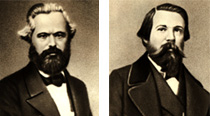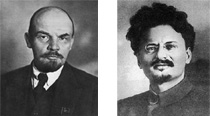The article below may be copied and circulated but proper attribution of authorship is required.
The Chechen war
Copyright: Iskra Research; By: F. Kreisel; Jan. 8, 1995
The brutal assault of the Russian army on Chechnia is another step in the descent of the whole post-Soviet society towards capitalist barbarism. We have said long ago that the process of restoration of capitalism and integration of the former USSR into the world capitalist system is bound up with the destruction of the economies and cultures of the peoples of the former Soviet Union.
This assertion is based on the simple observation that the whole industrial-technological-agricultural economy of the Soviet Union was built in isolation, protected from world competition and world division of labor. There is simply no room in the world marketplace for the relatively inefficient Russian, Ukrainian or Latvian industrial complexes.
Leon Trotsky explained in his 1936 book The Revolution Betrayed that as long as the Russian economy was backward and largely pre-industrial, the Stalinist bureaucratized central planning could succeed in the relatively simple task of copying and buying technologies from the West, building new industries from scratch, training millions of peasant youth as technicians and engineers, etc. The progressive elements of a socialist society, i.e. the nationalized industry and centralized planning, could for a time predominate over the reactionary elements of bureaucratic misrule, suppression of criticism and the overhead costs of the gigantic apparatus of the police and the bureaucracy.
But as the economy grew, new industries multiplied and the cultural level of the population rose, bureaucratic planning inevitably came into conflict with the demands of Soviet society. Hence the bloody purges, the GULags, the famines, the waves of national oppression and genocide, etc. The Stalinist program of "socialism in a single country" was a reactionary utopia back in the mid-twenties when it was first elaborated by Bukharin and Stalin. By the end of the 20-th century it had brought the peoples of the former Soviet Union to a debacle.
The present conflict.
Yeltsin is wrong on many levels. His major excuse, that he is putting down a criminal gang, is sheer hypocrisy. Yeltsin heads the largest and the strongest gang of thieves and bandits. He has been looting billions. Dudayev is a minor, local crime boss, whereas Yeltsin is the Godfather of all the Russian Mafias.
The recent article in the Trotskyist newspaper, the International Workers Bulletin correctly stated that the primary concern of both the Moscow warlord Yeltsin and of the local warlord Johar Dudayev is neither the principle of the unity of Russia or the self-determination of Chechnia.
In 1991 Yeltsin broke the Soviet Union up so as to wrest control over the assets of the Soviet state from Gorbachev. He then proceeded to loot and sell off the Soviet industry on the world markets. Now, Yeltsin wants to maintain and expand his control over the oil wealth of this region around the Caspian sea. Ten years ago general Dudayev was defending the geo-political interests of the Moscow bureaucracy in Afghanistan. Now, he is trying to wrest control over the oil routes from Azerbaidzhan and Kazakhstan for himself and his circle of budding Chechen capitalist robbers.
Imperialist interests.
Up until now the interests of the major imperialist powers in the Russia-Chechnia conflict lay with Yeltsin since the central Moscow bosses could deliver Caspian assets for sale on the world markets. Prime Minister's Chernomyrdin's recent sharp turn to lift restrictions of oil exports is a move to entice the western oil companies and governments to stick it out with Moscow. Western attitudes can quickly change if they perceive that the Kremlin has lost its ability to control the oil resources of the region. It is quite likely that Washington and Bonn might then discover the virtues of democratic self-determination and local power devolution.
Since the breakup of the Soviet Union the major imperialist powers have been trying to carve out spheres of interest in the former Soviet Union. Because the United States has during the past 20 years lost its economic hegemony, its economic interests have recently exhibited a conservative character. For example it had tried unsuccessfully to hold together Yugoslavia and the Soviet Union.
In contrast, the more dynamic German and Japanese economies had welcomed the breakup of the ex-Stalinist states and moved with a much greater agility to pick up their choicest pieces. Japanese investments, for example, are directed almost exclusively to the Soviet Far East. Germany had invested more into the Soviet economy than the other major Western states combined.
It is clear that the present conflict will sharpen and intensify the inter-imperialist rivalries throughout the whole giant region of Eurasia. We shall see shortly a tug of war among the major powers, the setting up of proxy local powers in places like the Crimea, Azerbaidzhan, Kazakhstan, Yakutia, etc. This road leads to a further balkanization of both Russia and the other former republics of the USSR.
Russian "democracy" in tatters.
The reports from Moscow and Grozny paint a picture of a total breakdown of all pretensions to a civilized, liberal or at least orderly regime in Russia. Ever since the storming of the Parliament in October 1993 the Yeltsin regime has been moving in the direction of Bonapartism and totalitarian control. Yeltsin had lost all personal popularity and now rules through a system of appointed regional governors and extra-legal government decrees.
Yeltsin's major weapon of control is now centered on special security detachments under such shadowy ex-KGB generals like Korzhakov and Stepashin and on the army headed by his political crony Grachev. He balances himself through a system of semi-organized economic looting and patronage. Increasingly he turns for support to the ideologues of fascism like Zhirinovsky, to the religious Orthodox obscurantism, racism and Great Russian chauvinism. Reports from Moscow describe police roundups of dark skinned inhabitants, arrests of anti-war demonstrators, deportations and street beatings by fascist gangs.
The various groups of "moderate" or liberal politicians (one cannot speak of parties since most of these groups have no program or rank and file members) are prostrate. They wring their hands in despair but have no alternative programs. All the various political formations, from the "national Bolsheviks" on the left to the Russian fascists or monarchists on the right had long ago agreed on the need for a "free market" and private property. All of them still delude themselves and the masses that some sort of a national, uniquely Russian path to salvation is available.
Recent reports from Moscow speak of a power struggle in the top echelons around Yeltsin. Whether Yeltsin remains in office, a "strong" general takes charge in a palace coup or another newly minted "democrat" comes in from the street, one thing is clear: Russia is headed for a collapse of central authority.
It is clear that the old Soviet army has utterly collapsed. An interview in the London Financial Times painted a picture of complete demoralization. An officer in the 14th Motorized division told the reporter that he and the majority of his fellow officers had tried to resign their commissions rather than proceed with the slaughter of Chechen villagers. A number of prominent generals also tendered their resignations. A report in today's (Jan. 8, 1995) "New York Times" describes barely trained 18 and 19-year old draftees stumbling around, trying to understand what it is they are supposed to do in Grozny.
It is possible that Grachev will still succeed in bombing the rebellious Chechnia back into the Stone Age. But both he and his master in the Kremlin understand that in the future they will have to build a different armed force. To conquer and control rebellious provinces they will need a force of bandits, rapists and fascist thugs, held together by promises of looting and payoffs.
The economy.
The economy continues to hemorrhage as all industries, heavy, consumer, oil and gas and even the agriculture continue their steady downward spiral. Electricity shortages are forcing the shutdown of factories, whole towns, and even the Moscow missile control center. The working class is reduced to an uncertain diet of bread and potatoes. The farmers are forced to abandon tractors, harvesters and trucks because of the widespread shortages of spare parts and fuel. Public health disasters loom on the horizon as the production of pharmaceuticals has ground to a halt and hospitals lose their funding due to hyper inflation.
Masses of workers are faced with disaster as their factories die of strangulation. Looting of the economy began some time ago, during the Brezhnev period of stagnation. This looting and sell off of industrial assets had in the past five or seven years assumed mass proportions. Under Gorbachev and then under Yeltsin the factory managers tried to sell off all the enterprise assets. Industrial investments dried up. It is noteworthy that since 1991 the Soviet Union and most of its successor states have been running record trade surpluses. These surpluses are the result of a total cessation of plant investment and renewal. According to the reports of the World Bank, the great majority of export earnings (they guess over 80%) is salted away in nameless western bank accounts.
Today, most of the choice pieces had already been stolen and sold. Factories throughout the former Soviet Union more and more resemble giant scrap heaps full of rusting, obsolete equipment and ragged workers trying to hand tool miscellaneous small items for sale on the bazaar.
A few years ago the overwhelming majority of Soviet intellectuals supported the restoration of capitalism. They provided the driving force for the breakup of the Soviet Union into its constituent parts. These illusions of capitalist plenty have by now evaporated. Today, this layer is the most disillusioned and cynical. In their mass, they are trying to escape the results of their own handiwork and are fleeing to the West.
On every level the capitalist Russia is descending to previously unplumbed depths of barbarism, social, cultural and economic destruction and degradation.
History — past and future.
Russia had reached a dead end in its capitalist development back in 1917 when Russian capitalism proved its weakness in the struggle against its economically more advanced and aggressive rivals, especially Japan, Germany and the United States. Russian defeat in the Russo-Japanese war and then its economic collapse and defeat in the First World War were simply the most obvious signs of the relative decline of the empire of the Romanovs vis-a-vis the faster growing industrial machines of Japan and Germany. Russian bourgeois democracy proved still born in 1917. Neither Miliukov, nor Kornilov, Kerensky or Chkheidze provided the Russian nation with any viable solutions to the historical dilemma of the belated character of Russian capitalism.
Progress for Russia lies on the path of socialist, not capitalist development. It was so in 1917 and it is even clearer today. In 1917 the Bolsheviks were the most theoretically and politically advanced of all the detachments of Marxism. As they took power in a backward, predominantly peasant Russia they knew that their salvation lay in the world revolution. Today, it is Trotskyism and the International Committee of the Fourth International which point the way to the world socialist revolution as the next step for mankind in its development.




